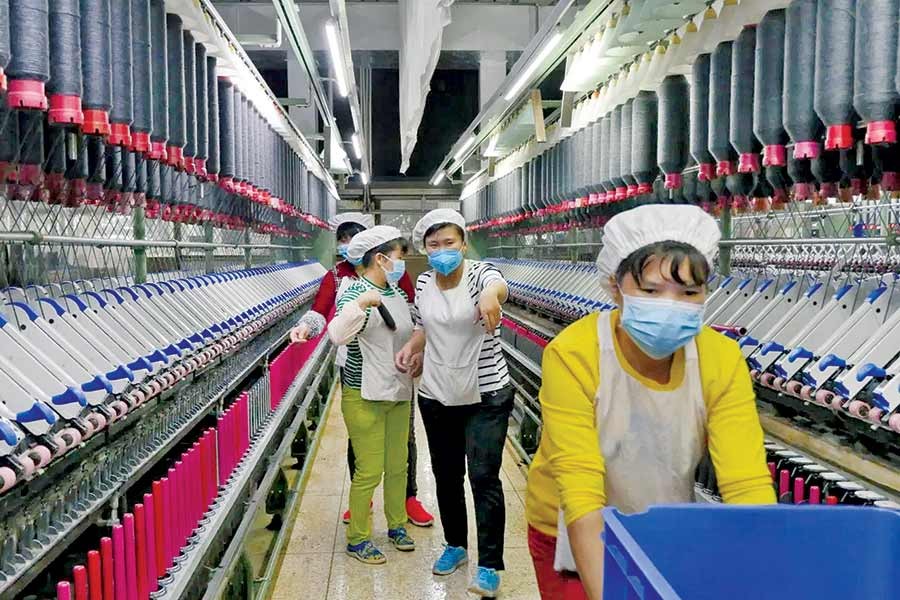Bangladesh's RMG sector is now in threat from both buyers' and suppliers' end due to the global coronaviurs situation. Initially, it was assumed that Bangladesh will be benefited from coronaviurs as most of the global brands are planning to shift their export orders from China to other RMG manufacturing countries like Bangladesh, Vietnam, India, Indonesia and Cambodia. Some globally reputed buyers have already started shifting their export orders from China to Bangladesh since January, 2020. But now it's time to think whether the coronaviurs situation will create opportunities for RMG sector in Bangladesh or it is a big threat for the country where RMG contributes around 84 per cent to total export earnings.
Our garment industry is heavily dependent on China for raw materials. We source around 60 per cent woven fabrics, 15-20 per cent knit fabrics and 80-85 per cent dying chemicals and accessories from China for RMG export. After China's shutdown since January, 2020, sourcing of our RMG raw-materials has been affected badly and it may take another three to six months to stabilise the supply chain from China. The alternative raw material supplying countries like India are also affected by coronaviurs.
Our garment industry will hardly be able to mange up to April, 2020 with current stocks and those on-board ships. But after April, 2020, they may face serious crisis due to lack of availability of alternative sources of raw materials at cheap rates. So, it is not unlikely that our exporters will face problems in maintaining shipment schedule which might result in order cancellation, discounting, or air shipment at exorbitant costs.
More importantly, many of our buyer countries are now gradually being affected by coronaviurs, especially the EU countries. According to Export Promotion Bureau (EPB) data, Bangladesh's export earnings from ten major countries including USA, Germany, France, UK, Spain, Italy, Netherlands, Poland, Canada and Japan in the FY 2018-19 was $28.89 billion (including $25.53 billion from RMG alone) out of total export earnings of $40.53 billion (including total RMG export of $34.13 billion).
Bangladesh's top ten buyer countries are now corona-struck, i.e., 71.23 per cent of global export market is in problem. One of our major RMG buyer countries, Italy is now shutdown and some other EU countries are also showing signs of anxiety. In the FY 2018-19, Bangladesh earned around 55 per cent of total export from EU countries including $1.64 billion, i.e. 4.05 per c ent (mostly RMG goods) from Italy. So, currently 55 per cent of our export markets in the EU is almost in a shutdown position and most of the globally reputed buyers from EU will be affected and incur huge losses. The buyers may ask for discount, cancel or reduce their export orders to overcome their current difficulties. So, our garment exporters will not be at ease to execute export orders in hand and also to obtain future orders.
However, most of the RMG factories already procured raw-materials or opened back-to-back LC (BBLC) for importing raw-materials on deferred payment basis for executing export orders in hand against Sales Contract (mostly). Now, if the buyers ask for discount, cancel the existing sales contract or reduce export orders, the exporters will face problem in settlement of deferred payment against their outstanding BBLC, which will have chain effect on all the backward linkage industries and banks.

If we fail to take correct initiatives now, most of our medium and small garments industries may not be able to manage the upcoming challenges. So, this is the right time to take proper initiatives.
• The government should take initiatives for formation of a high level strategic committee comprising all the stakeholders including BGMEA and BKMEA, policy makers, bankers (including the central bank) to identify problems and suggest probable remedies.
• BGMEA and BKMEA should open monitoring cells to observe and support their members and maintain proper MIS for global impact of coronaviurs.
• The government may develop crisis management fund through Bangladesh Bank (long term refinance fund @ zero/ lower rate of interest) to support RMG sector for settlement of deferred payment against already imported raw-materials or outstanding BBLC and for overcoming the current situation, which will indirectly support our backward linkage industries and banking sector.
• The government may consider increasing cash incentives or developing separate cash incentive packages through Bangladesh Bank to support affected RMG factories.
• Special exchange rate incentives (like foreign remittance) to the RMG Industries for the time being may be allowed to support their operating expenses.
• Bangladesh Bank may take initiatives to relax some terms and conditions in their guidelines to overcome the current situation.
Md. Rashaduzzaman is a corporate banker & DBA researcher at Department of Finance, University of Dhaka.
rashedmistmba3@gmail.com


